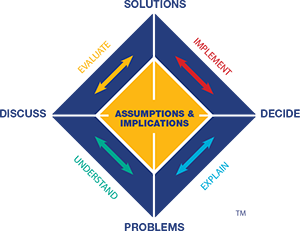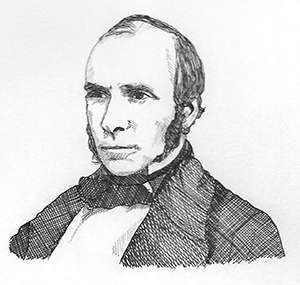Assumptions and Implications
-
-

A major difficulty in most problem solving, is that all of the information needed to make a decision is not available. Also, it may not be possible to access it in the time available. Therefore, certain assumptions have to be made, and also an estimate on the implications on the decisions. Having a firm model on which to base your assessment of assumptions and implications, is vital. It can guide the questions that you ask, plus the interpretation that you put on the information generated, and the risk assessment.
Therefore, the five major skills identified in the Margerison Communication and Problem Solving Model need to be used in a sharp and focused way. The results should be that you are clearer on the:
-
Understanding of the assumptions and the implications of acting on them.
-
Explanation of the assumptions and the implications.
-
Evaluation of the assumptions and the implications can help reduce the risks.
-
Implementation of action should test the assumptions and have a clear plan that takes into consideration the implications.
Problem solving goes wrong when the assumptions are wrong. Therefore, a key phase is to list the problem issues and the assumptions that are being made in trying to solve them. Regular tests and checks are required in order to gain feedback that corrects the assumptions. However, it is vital in a team project to discuss the way this is done with others, so that everyone can share in the thinking. An important skill in doing this is Summarizing. This enables everyone to gather an overview and challenge any part of it. Otherwise, false thinking may compound false thinking, as it has done in much medical and scientific work, where assumptions were made about causes that proved to have little foundation.
-
-
John Snow

An example is that cholera, until the 19th century, was assumed to be carried through the air, but evidence proved that it was primarily a water-borne infection. John Snow was a physician who led the world in using anaesthesia and medical hygiene. From the introduction of anaesthesia in obstetrics, to his brilliant diagnosis of cholera in the Victorian age of Britain, he revolutionized the world of medicine.
His research into the implications and evaluation of assumptions, led to the discovery of cholera being water borne. Therefore, action could be taken for preventative measures, which saved countless lives.
"You and I may not live to see the day, and my name may be forgotten when it comes, but the time will arrive when great outbreaks of cholera will be things of the past; and it is the knowledge of the way in which the disease is propagated which will cause them to disappear." – John Snow.
-
Applications

Therefore, in all your communication and problem solving work, ask questions to elicit assumptions and implications.
Then go and find as much data as possible in order to conduct a diagnosis, and draw conclusions that reduce the level of risk, and improve the chances of success.
Think of a specific problem you are facing and list the assumptions you are making. Also, list the implications if any decisions you are about to take.
-